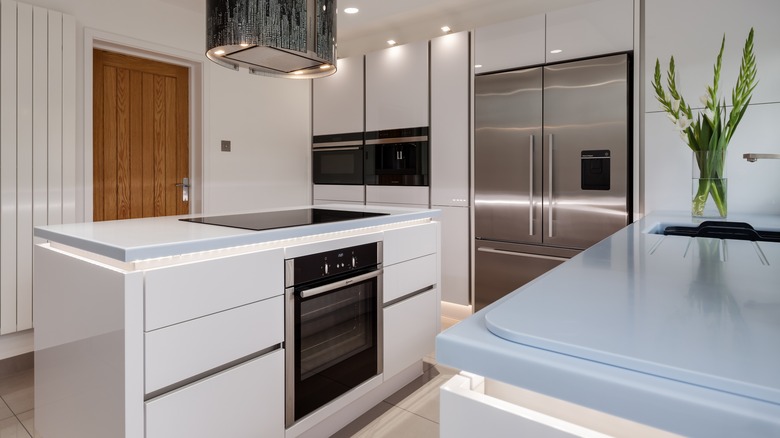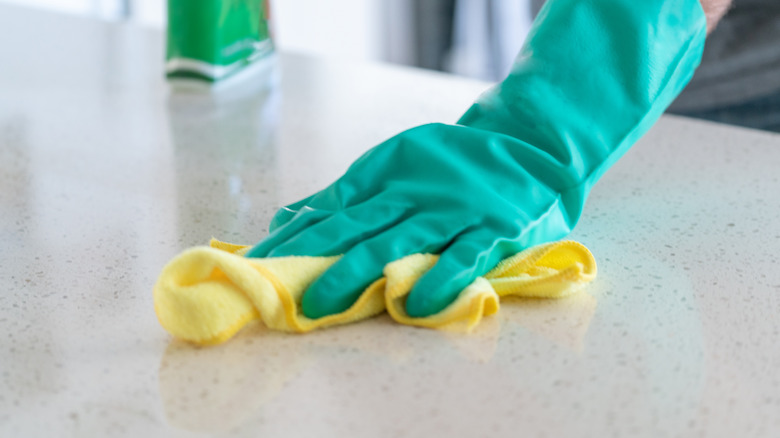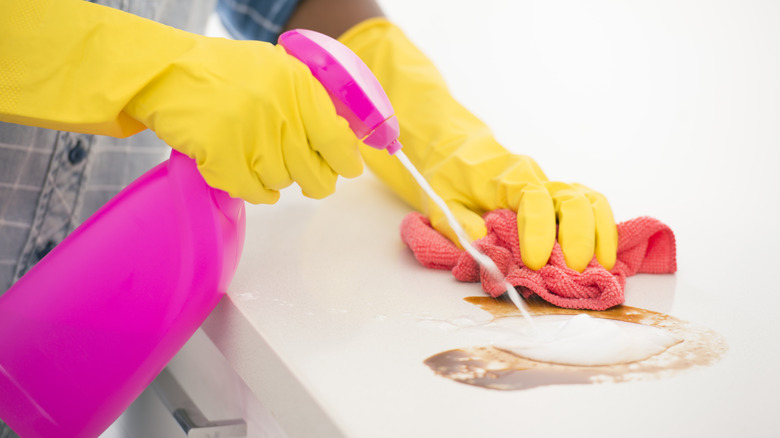Remove Stains On Your Solid Surface Countertop With These Common Cleaners
We may receive a commission on purchases made from links.
Whether your home came with solid surface countertops or you installed them yourself, you probably want to know how to keep them in good shape. Compared to other types of countertops, solid surface ones are remarkably easy to keep clean, but that doesn't mean they're immune to stains. If you find a stain on your solid surface counters, you can use common products like multipurpose cleaners, ammonia-based cleaners, dish soap, or bleach to remove it.
A solid surface countertop is made from natural minerals mixed with acrylic or polyester resins, plus pigments to create a color or design. Corian is a very popular brand, but there are others to choose from also. While it's often made to look like natural stone or wood, solid surface is quite a different material (not to mention cheaper). It's called "solid surface" because it's one solid material throughout, with invisible seams and no pores. That also means it's resistant to liquids, bacteria, or mold, and the cleaning process is simple even if there are stains. Here's what to know.
How to clean solid surface and remove stains
Cleaning solid surface is simple as long as you have the right products on hand, and you may be able to use what you already have. For everyday cleaning, use dish soap and water on a soft cloth. Ammonia-based cleaners are also helpful for wiping away residue on the surface — many multipurpose cleaners will work, or you can use something like Target's Lemon Scented Ammonia. To prevent hard water stains, always wipe the counters dry soon after they get wet.
Stain removal depends on the type of stain. In general, multipurpose cleaner and some gentle scrubbing is enough — use a scrubbing pad, sponge, or microfiber cloth. Bleach diluted with water can remove more stubborn stains or disinfect the surface, and vinegar is helpful for dissolving hard water stains. For brown stains, try a cleaner with oxalic acid such as Bar Keeper's Friend. A mild abrasive cleaner can help with dyes, blood, and other difficult stains, and it is safe to use as long as the solid surface is not high-gloss.
The process is similar regardless of the cleaning solution you use. Spray it generously on the stain, then scrub in a circular motion. You may need to let the solution sit on the stain for a bit so it can penetrate. Rinse with water and then wipe dry.
What to avoid when cleaning solid surface
Solid surface is a durable material, but it can still get damaged. Avoid using abrasive cleaners or strong acidic cleaners, such as oven cleaners, toilet cleaners, paint removers, or drain cleaners. These products can damage or dull the countertops, especially if they have a glossy finish. If any of these substances get on your countertops accidentally, rinse them with water as soon as you can. Also, it's best not to make a habit of using glass or window cleaners, as they can leave buildup.
It's not safe to use harsh scouring pads or cut directly on solid surface — this can create scratches and scuffs. If you do notice small scratches, you can try fixing your solid surface countertops yourself with a Scotch Brite pad or something similar. Blend in the buffed out area with the rest of the sink, then rinse and dry the countertops. Lastly, avoid putting hot cookware directly on the countertop; use a heat pad to avoid damage.


